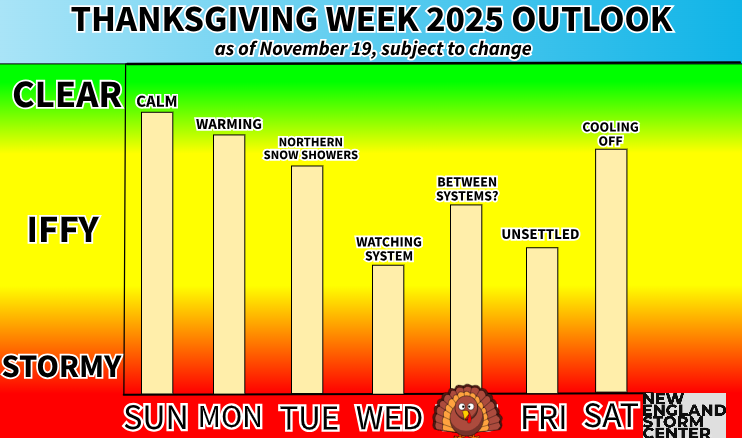Hurricane Season: Areas of Interest Currently Being Watched
- Tim Dennis
- Aug 6
- 2 min read
While New England remains quiet on the weather front, things are becoming more active across the Atlantic Ocean as hurricane season enters its most active time of year. There are currently two areas of interest in the Atlantic, along with Tropical Storm Dexter.

The first area of interest off the southeast coast currently has a 40% chance to develop into a tropical system by this weekend. Imminent development is not expected. This area of low pressure is expected to slowly move north before turning more northeastward, paralleling the east coast. A continued ridge of high pressure over New England is expected to steer the system well offshore, keeping New England dry and warm this weekend. Trends will be monitored for southernmost New England, however, as north/westward trends could bring wetter weather closer.
Below: Euro showing potential weather Saturday afternoon, with the developing system passing well offshore of Cape Cod:

The second system, currently in the eastern Atlantic, has a growing chance to develop into a tropical system. Development will likely be slow over the next few days, with a 20% chance of development within 48 hours. The system currently has a 60% chance to develop within the next week. After initially battling some dry air, conditions will turn more favorable for gradual development.

The system would be a classic Cape Verde storm as it marches across the open Atlantic in a west-northwest motion. Should the storm be able to develop more easily, it will likely take the typical Cape Verde route and bend to the north and eventually northeast, well away from land. Should it struggle to develop, it could drift closer to the US east coast, or at least Bermuda. At this point, a curve well away from the US remains most likely.
Heading into the late summer is when Cape Verde systems become likely to form. These storms are ones that begin to develop near the Cape Verde islands off the African coast. These storms typically slowly move over the open Atlantic in a west-northwest direction.
These storms are often steered north and west due to a large semi-permanent area of high pressure over the Atlantic. Though the exact track of specific storms depend on various other factors as well. To be clear, this is not a specific forecast for the current wave off the African coast, it’s a general idea of a kind of system that can form later in the season, near the season’s peak.

Tropical Storm Dexter will continue to move over the open north Atlantic Ocean as it gradually breaks down and weakens, affecting no land. The storm made its closest pass to New England earlier this week, bringing increased swells and rip currents. Outside of these three areas of interest, a parade of tropical waves is expected to move through the Atlantic. There are no signals for any major development at this time, but as the peak of hurricane season quickly approaches, this could change quickly, especially as more activity is now beginning to bubble up.




Comments